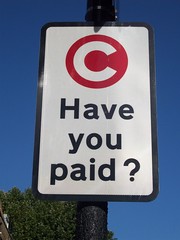
Congestion charge
Originally uploaded by jeni rodger.
Proposals for congestion charging in Britain have been met by a petition against the idea.
Transport Secretary Douglas Alexander said: "Unless motorists and families can see the benefits, a national road pricing system won't happen."
He adds that he has told those bidding for the pilots: "There must be a fair deal for motorists. These councils will get extra cash to improve public transport because, if a local scheme is to work, people need real alternatives, including better bus services."
The petition was launched on the Downing Street web site under an experiment introduced by the government last year.
It says: "We the undersigned petition the Prime Minister to scrap the planned vehicle tracking and road pricing policy" and was submitted by Peter Roberts, a motorist from Telford, Shropshire.
With just eight days to go to the deadline for signing, the total stood at 1,127,817.
Paul Biggs, spokesman for the Association of British Drivers, said today that he was very pleased with the response to the petition.
He said: "The only way road pricing can work is to actually price people off the roads.
"That is one reason they will sign the petition.
"Another reason they will sign it is that they are going to be trapped and traced wherever they drive.
================================================
The surveillance implicit in the scheme is a valid reason for objecting, but this is not necessary for a effective congestion charging, and other means should be pursued. For example, a proposed scheme for Cambridge about 15 years ago proposed charging for vehicles when their speed dropped below a certain threshold (about walking pace), when it could be assumed that they were in a congestion situation. This foundered on the technology, but these days, using cellphone technology, it should be possible to devise a system using beacons and black boxes with pre-paid metering to charge differentially according to time and location, without actually tracking individual vehicles.
But there would be just as much opposition, because people want to be able to drive their cars wherever they want at all times, on uncongested roads. They fail to make the connection between their own actions and that which they object to. And note how hypocritical concern for "the motorist and families" has entered the political rhetoric. What about "the pedestrian", "the cyclist" or "the child" or "the carless elderly", groups currently at the bottom of the heap when it comes to the shaping of the public environment in Britain.
Kommentarer